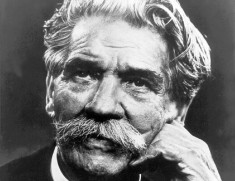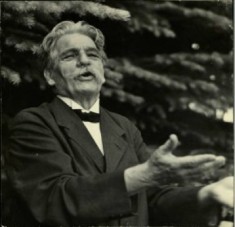| Albert Schweitzer | |
|---|---|
 |
|
| Philosopher | |
| Born | Jan. 14, 1875 Kaysersberg, Alsace-Lorraine, Germany (now Haut-Rhin, France) |
| Died | Sep. 4, 1965 (at age 90) Lambaréné, Gabon |
| Nationality | German, French |
Albert Schweitzer remains one of the most well-known and revered philosophers of the 20th century. His work as a medical missionary on the continent of Africa brought him great acclaim. His theological and philosophical studies into the life of Jesus also contributed to his fame. During his life, Schweitzer became one of the few vaunted figures who received a Nobel Prize.
Schweitzer’s Early Years
Albert Schweitzer was born on January 14, 1875, in Kaysersberg, Germany. After World War I, this territory became part of France. His father was a pastor who contributed to teaching his son music. Albert was a student at Mulhouse High School and he studied the organ as part of his music lessons. So enthused was Schweitzer about learning music that his tutor did not even charge him for lessons.
When Schweitzer was 18, he began attending Kaiser Wilhelm Universität of Straßburg and commenced his studies of Protestant theology while also studying the piano. Throughout his musical studies, he maintained a strong interest and passion in the compositions of Richard Wagner. As he matured as a musician, Schweitzer became known as a great scholar in music and an accomplished organist.
Beginnings of a Career
In 1899, Schweitzer went on to become a deacon at the Church of Saint Nicholas in Strasbourg. Around this time, he believed it was necessary for him to give something back to the world and its people. This may have influenced his decision to write the History of Life-of-Jesus Research. This work was later published in 1910 under the title The Quest of the Historical Jesus and this was a popular, thought-provoking work that noted the image of Jesus and his teachings changed with the times and also in accordance with the points of view of certain authors.
Schweitzer began to study medicine and considered himself somewhat of a medical philosopher and tied his Christian beliefs to his formal study of medicine. In 1912, he attained his medical degree and put it to use by becoming a missionary in Africa. He set up a hospital along the Ogooué River in Gabon where he treated an enormous number of the local people.
Beliefs Rooted in Anti-Colonialism
Schweitzer was quick to point out that a lot of the problems in Africa were due to European colonialism. These beliefs were considered controversial at the time because many European powers had expanded their empires by colonizing much of Africa and other parts of the world. To an extent, the strong Christian beliefs of Schweitzer (along with his firsthand experience in Africa) led him to develop sentiments that were in opposition to colonialism.
Reverence for Life
The notion of a ”Reverence for Life” was a philosophical belief held by Schweitzer that professed that western civilization was beginning to crumble because it lost its connection to an ethical or moral compass. In Gabon, Schweitzer invested a great deal of contemplation on universal rules and theories on ethics and ethical behavior.
 While no one can say for sure if he could be considered the ultimate authority on the subject, his insights into ethics became popular and have been the subject of a great deal of study. The subject of a “Reverence for Life” became a major theme in his books and lectures.
While no one can say for sure if he could be considered the ultimate authority on the subject, his insights into ethics became popular and have been the subject of a great deal of study. The subject of a “Reverence for Life” became a major theme in his books and lectures.
In his book The Philosophy of Civilization, there is a significant portion of the work dedicated to the “Reverence for Life.” Among the more interesting ways he looked at ethics was through the lens of so many other philosophers. Schweitzer noted than many philosophers had tried to define ethics and their overall attempts to create a universal ethical standard were not successful. In many ways, Schweitzer believed the search for sound ethical behavior was one that required a lengthy and continual process of inspection and study.
Schweitzer’s Later Years
Schweitzer was indeed recognized for his work. In 1952, he was awarded the Nobel Peace Prize. Even though he was reaching an advanced age, he continued his activist work. Namely, he tried to raise awareness against nuclear tests and the development of nuclear weapons. He become one of the most well known critics of these weapons and raised great awareness to the cause.
On September 4, 1965, Albert Schweitzer passed away at the age of 90.